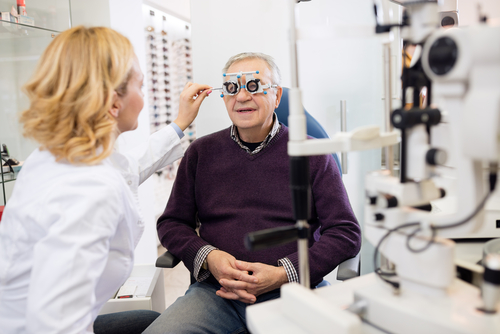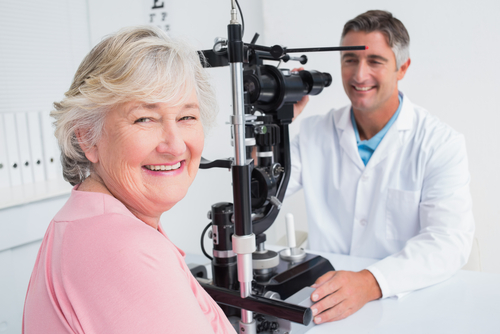Senior Discount Network Vision Care And Eyeglasses Deals
Senior Discount Network Vision Care
As we age, our vision begins to decline due to various factors, such as the stiffening of the eye’s lens and the weakening of the muscles that manage eye movement. Addressing vision problems requires appropriate treatments tailored to the specific issues affecting your eyesight, ensuring you achieve optimal clarity.





What Vision Issues Arise with Aging?
As we age, a myriad of conditions can manifest, each requiring distinct treatment approaches. These conditions encompass:
Presbyopia – a prevalent affliction among individuals over 40 years old. This condition hinders the ability to read fine print, and eventually, any print at all without the aid of glasses. As the years pass, you may notice yourself holding menus, newspapers, or books at arm’s length to see the text more clearly. This is indicative of developing presbyopia. In youth, the lens of the eye is pliable, but as we age, it becomes more rigid, losing its ability to swiftly adjust to nearby objects.
Floaters and flashers – tiny specks drifting across your field of vision. These are a result of minute fibers within the eye clumping together and “floating” across the lens. Typically benign, these floaters can become concerning if accompanied by flashes of light, which could signify a more serious underlying issue.
Dry eyes – characterized by itching, burning, and redness. This condition likely stems from inadequate tear production or tears of poor quality, failing to sufficiently lubricate the eyes.
Cataracts – clouded areas that obscure the lens of the eye. In youth, the eye functions like a clear camera lens, directing light to the retina and communicating visual information to the brain. As cataracts develop, they obstruct light from reaching the retina, leading to impaired vision.
Glaucoma – while it can arise at any age, glaucoma is more prevalent as we grow older. It results from excessive fluid accumulation within the eye, potentially culminating in blindness if left untreated.
Each of these conditions requires careful management and treatment to maintain optimal eye health and preserve vision quality as we age. Understanding and addressing these issues promptly can significantly enhance the quality of life in our later years.
How Can Vision Problems Associated with Aging Be Addressed?
Presbyopia is typically managed with the use of glasses or contact lenses. Many individuals opt for “readers,” non-prescription glasses worn solely for reading purposes. For those who also experience difficulties with distance vision, bifocals or trifocals may be prescribed, offering clarity for both near and far sight. Floaters generally go untreated unless they signal a more severe issue, such as a detached retina. Dry eyes can be alleviated with eye drops, and doctors might recommend using a humidifier at home. Severe cases of dry eye might necessitate surgical intervention. Cataracts require surgical treatment once they reach a particular size; this involves the removal of the cloudy lens and its replacement with an artificial one to restore clear vision. Glaucoma management often includes medications like prescription eye drops, although surgery may be needed to alleviate intraocular pressure.
Is Vision Insurance Essential for Senior Citizens?
Original Medicare excludes vision expenses, although certain supplemental insurance providers offer vision plans. It’s essential to confirm that your eye care specialist is part of the supplemental plan’s network. While Medicare might cover eye surgeries such as those for cataracts or glaucoma, it does not include routine eye exams. Therefore, obtaining a private plan may be necessary to handle those costs.
What Services Are Included in Senior Vision Plans?
Vision plans typically encompass the expense of an annual eye exam along with treatments for various conditions. For instance, they often include coverage for eyeglasses—both lenses and frames—or contact lenses, depending on your preference. Additionally, vision insurance generally covers prescribed items such as eye drops recommended by your doctor. Some policies also extend to surgeries not usually covered by standard healthcare, like LASIK. However, it’s important to note that most older adults may not qualify for such procedures due to presbyopia.
Are Discounts on Vision Care and Eyeglasses Available for Seniors?
Many companies provide vision care discounts specifically for seniors. AARP members, for instance, are eligible for such savings, as are veterans utilizing Veterans Administration services. Additionally, members of warehouse clubs such as BJs, Sam’s Club, and Costco can often benefit from reduced prices on vision care and eyeglasses. However, one of the most effective ways to secure these discounts is by signing up for SeniorDiscountNetwork.com, where a variety of deals on eye exams, glasses, and other eye care necessities can be found.
Leading Vision Plans for Seniors: The Top Five
Here are the top five vision plans for seniors, based on thorough evaluations by multiple watchdog organizations:
Direct Vision Insurance – Boasts an extensive network, increasing the likelihood your provider is included.
Humana – Provides vision policies starting at just $14 per month, making it an economical option for covering vision care expenses.
Spirit Vision – Despite being a smaller company, it offers substantial payouts and also includes dental insurance.
UnitedHealthcare – Delivers excellent benefits at competitive rates, with a broad network of providers.
VSP – Features plans specifically designed to complement Medicare benefits.
To reduce your vision care costs, consider signing up for SeniorDiscountNetwork.com. Registration is free, and you can start saving right away. Just complete the simple online form to begin enjoying discounts on your vision needs immediately.



